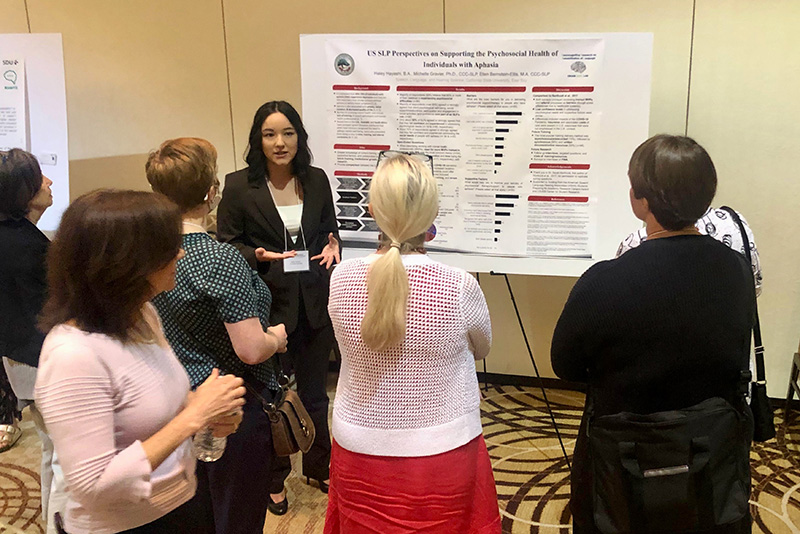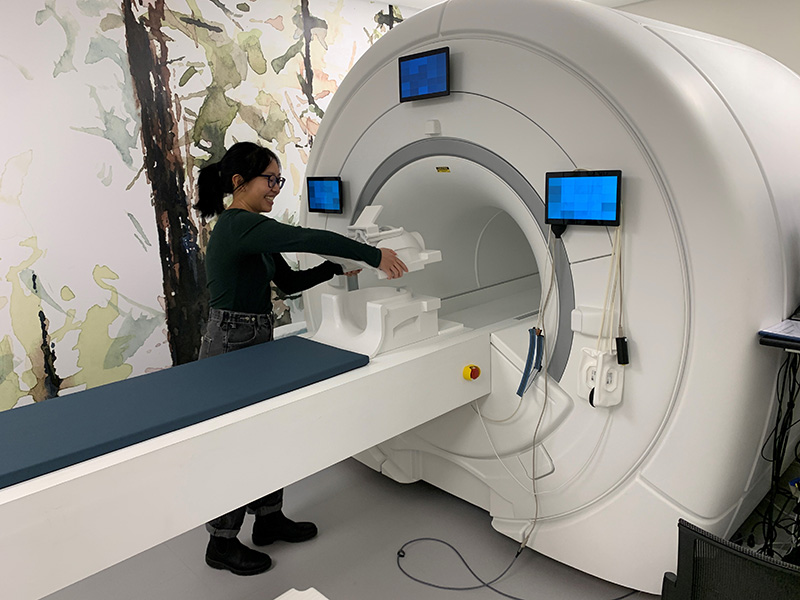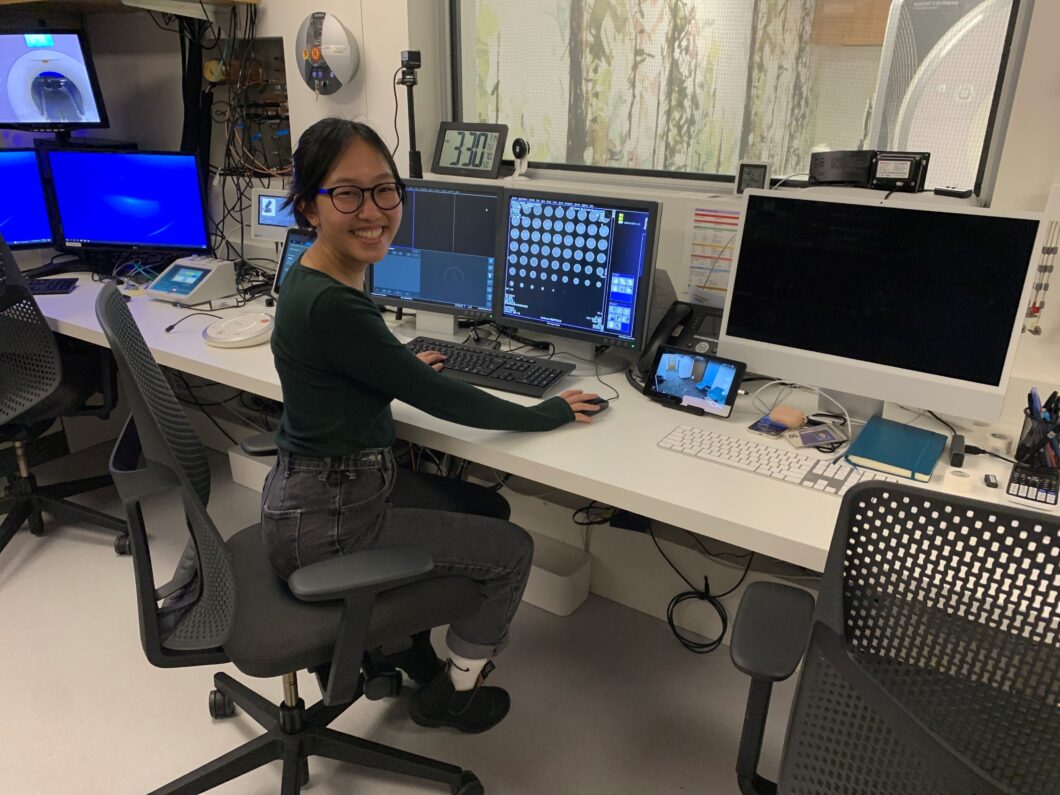The Students Preparing for Academic-Research Careers (SPARC) Award aims to cultivate student interest in pursuing a research doctorate (PhD) in communication sciences and disorders (CSD) and a career as a faculty-researcher in CSD. ASHA grants 12 awards of $1,000 each, including up to two awards dedicated to students attending master’s and baccalaureate universities.
In this Q&A, recent SPARC award recipients Haley Hayashi, a speech-language pathology graduate student at California State University, East Bay, and Aivy Nguyen, a speech and hearing sciences major at the University of Washington, discuss their passion for CSD research and what drives it, talk about their current projects, and explain how the SPARC award helped put them on a path to success.
Why did you decide to pursue research in CSD?

Haley: I was involved in undergraduate research in a different field and found it extremely interesting and rewarding. I enjoyed diving into a subject, identifying an issue or question, working to find a solution, and seeing that process to its conclusion. The process of research in CSD is particularly rewarding because the information gleaned from research can directly impact the lives of those living with communication disorders. I was passionate about subjects such as mental health and diversity in the field, and I saw how research can bring awareness and solutions to those issues. It also has been a great way to improve my writing, critical thinking, and time management skills, all of which I believe will help me as I enter the field. My research involvement has also been a great talking point in internship and job applications so far. I have found research to be very rewarding—both professionally and personally.

Aivy: I originally intended to become an orthodontist and was a dental assistant for over 3 years. That exposed me to patients with tongue tie and made me realize I was more interested in the mouth as an oral mechanism rather than from a dental perspective! I have since moved on to pursue speech-language pathology, where I became curious about the articulators. I knew I wanted to pursue research in CSD to delve into my interests, so I became a research assistant in a language lab to gain experience working with a team and understand the research process. After realizing how much I enjoyed research, I pursued an opportunity in a bilingual language development lab. I became involved in my mentor’s lab when he was my phonetics professor. We began talking about his research in Developmental Language Disorder (DLD) and found out that we both had interests in exploring the articulators! My experiences in these labs have shown me how tangible and applicable research can be to positively impact diagnoses and treatments of disorders!
Tell us about your current research.
Haley: I’m focused broadly on the psychological and social challenges experienced by individuals living with aphasia. For my thesis project, I surveyed SLPs to find out their thoughts and experiences with identifying and addressing psychosocial issues and collaborating with mental health professionals. I have also participated in projects related to a mental well-being aphasia conversation group collaboratively facilitated with social work graduate students, a study on the relationship between physical activity and aphasia, as well as a new grant exploring the experiences of those with aphasia in having their psychosocial needs met and how to better train mental health professionals.

SPARC award recipient Haley Hayashi presents her research at the International Aphasia Rehabilitation Conference (IARC) in Philadelphia, PA, in June 2022.
Aivy: I am currently researching DLD, which is a hidden impairment impacting a person’s ability to learn, comprehend, and use language to express their thoughts. It is an under-researched area but is incredibly important, as adults with DLD are more likely to be unemployed and have poor mental health compared to typically developing adults. The primary goal of my project is to investigate articulatory variability during speech production in adults with DLD. Data can help us build a better model of what might be happening in the brain in adults with DLD, ideally eventually leading to improved diagnoses and treatments for this common disorder!
What opportunities has the SPARC award created for you?
Haley: The SPARC award has been incredibly helpful in allowing me to access professional development opportunities that I may not have had otherwise. SPARC funding supported the purchase of research project materials and allowed me to attend conferences where I was able to network and present my research. Attending conferences has helped reinforce my interest in research, gain experience presenting to researchers and professionals, and make connections with other people in the field who share the same interests.

SPARC award recipient Aivy Nguyen conducts research in the Quantitative Imaging for Learning, Language, & Speech (QuILLS) lab in the University of Washington Center for Human Neuroscience (CHN) MRI facility.
Aivy: It has been extremely exciting to come up with a research question and collaborate with my mentors and other researchers in the field who have so much experience and expertise to share. When I applied for the award, I created a research plan that outlined my project goals. The award’s structure has kept me on track with these goals and has given me the opportunity to encourage BIPOC students to get involved in research. I am also currently working towards becoming a certified MRI operator to scan my participants. This has given me the opportunity to collaborate with the neuroimaging center to understand MRI protocol, learn a new set of skills, and become a more critical thinker. The SPARC award also provides support to attend my first conference and present research. I am looking forward to meeting professionals in the field and learning about their endeavors! This award has also provided structure and goal setting that put me on track to achieving research and professional milestones. When there are so many demands in school, having regular check-ins, goals, and structure can be very helpful to keep you on track.
What advice do you have for students who are curious about pursuing research?
Haley: I say, go for it! Research can be a fantastic way to make connections with other students and professionals, build extremely useful skills to support your future goals, and [obtain] an overall rewarding experience. If you’re not sure where to start, introduce yourself to professors in your department, let them know about your interest, and find out if they have research activities you could become involved with. Other research students can be a great resource of information as well. If you are working on identifying a research interest, ask yourself questions such as, “What do I want to know more about? What is a subject that makes me lose track of time when I’m reading about it? What kinds of research tools and disorders would I want to work with?”
Some advice I would give to those interested in applying for SPARC:
- Start preparing your application early!
- Have a clear idea of what your research and training interests are.
- Build specific goals around your research ideas. I was able to identify goals in my application that would support my professional development, such as giving a guest lecture in my mentor’s course, submitting to conferences and journals, and pursuing specific training/continuing education units in which I was interested.
- Get feedback on your application materials if you can.
- If there are former SPARC awardees at your university, don’t be afraid to reach out to them and ask for advice and feedback.
Aivy: Seek out an opportunity and try it! I would strongly recommend finding a mentor who can support you along your academic journey and with whom you feel comfortable approaching with any questions. See if professors in your department are doing research in a field that interests you. If you make connections with your professors and tell them about your interests, you might find that you two have plenty in common and that you would be a valuable asset to their lab! The more passionate and curious you are about your topic, the more fun the experience will be. Keep an open mind to the learning curve you will experience—because research is all trial and error!
Are you interested in earning a research PhD and embarking on a career as a faculty-researcher? Apply for ASHA’s SPARC award for the opportunity to receive $1,000 to pursue individualized mentoring associated with your teaching and research goals . . . and more! Applications are open now through April 30.
About . . .
Haley Hayashi is a graduate student studying speech-language pathology at California State University, East Bay, and a 2021 SPARC award recipient. She is a member of the National NSSLHA’s Inclusion, Diversity, Equity, and Action (IDEA) Work Group.
Aivy Nguyen is a senior studying speech and hearing sciences at the University of Washington, Seattle, and a 2022 SPARC award recipient. She serves as a Student State Officer–SLP, Washington.

